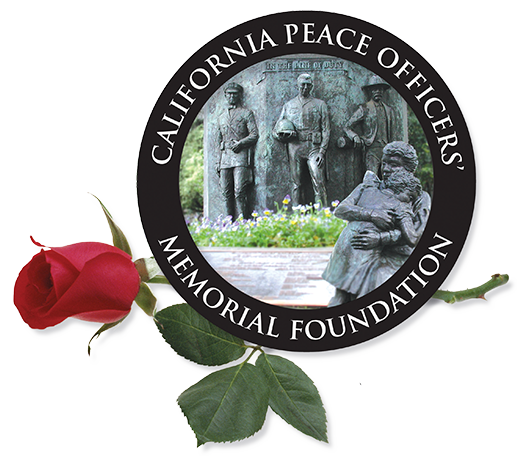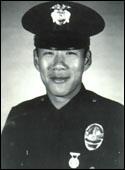Arthur Ken Soo Hoo was raised in Chinatown, served there for years as a Los Angeles police officer, and – in a tragic car crash – lost his life there.
The usually bustling business district of Chinatown briefly came to a stop Nov. 5 as a mile-long funeral procession bore the body of Soo Hoo, 33, through the area on the way to Rose Hills Cemetery in Whittier. It was the second such procession in two days. On Nov. 4, the man who died in the crash with Soo Hoo, LAPD Officer William Wong, was similarly honored.
The funerals closed what Police Chief Daryl Gates described as “a week of anguish and sorrow” for the LAPD and Soo Hoo’s friends.
Both men died when their patrol car was broadsided by a car estimated to have been traveling about 90 mph. The accident took place at Broadway and Alpine streets in the heart of Chinatown. Three men have been charged in the incident, including two who are still at large.
Nearly 100 police motorcycles led the procession down Broadway and toward the freeway. They were followed by trucks full of flowers and dozens of police cars with red lights flashing.
About 400 law enforcement officers from nearly two-dozen different agencies around Southern California and another 200 civilians attended the funeral at a quiet hillside chapel at Rose Hills.
The officers, wearing black stripes across their badges, stood at attention as the flag-draped casket was carried into the chapel, led by the LAPD’s traditional bagpipe player.
“He was the kind of guy that gave a lot to everyone he worked with,” said Officer Gary Palmer, once a patrol partner of Soo Hoo.
Reflecting on the days since Soo Hoo and Wong were killed, Gates said: “It was a week when we all asked, ‘Why?’ A week to assess the values and worth of our profession. And a week in which, through the deeds and lives of these men, we know we made the right decision.”
Gates called Soo Hoo tenacious, aggressive, and confident. “He was a warrior in search of peace and harmony,” Gates said.
Chinatown vendors turned from their vegetable and fruit stands and stepped from their shops to watch a funeral cortege of 80 LAPD patrol cars and nearly 70 motorcycles as a hearse bearing the body of police Officer William Wong was escorted from the Wah Wing Sang Mortuary on Sunset Boulevard to Rose Hills Cemetery in Whittier.
As the procession turned onto the Pomona Freeway, several people watched it, waiting in front of an austere concrete chapel near the top of a grassy slope in Rose Hills Cemetery. A sparrow chirped some distance off in the pine-scented air.
The officers left their vehicles and formed lines along the way into the chapel, while a solitary bagpiper piped his song of sorrow, a song that has become part of most funeral services for slain officers. And then the casket was borne by the pallbearers into the chapel.
Chaplain Sgt. Jerry Powell took the pulpit to address Wong’s widow, Martha; his 6-year-old daughter; his relatives and more than 350 officers. He began: “Today we will consider the good and the righteous.” Pastor Andrew Chan then said that Wong “has set a good example for us, no matter what line of work we do.”
And the bagpiper again played, before LAPD Chief Daryl Gates spoke. “It’s a great burden we must all shoulder,” said Gates in a low but strong voice. He referred to the risk of untimely death police officers face. Wong “was a warrior,” Gates went on, “a warrior in the battle for that elusive thing called peace in this community.”
“Bill was a police officer’s police officer,” eulogized Don Linfield, one of Wong’s closest friends and one of the pallbearers seeing him to his grave. Then in a wavering, small voice, he ended, “Goodbye, Bill . . . God bless you.”
Some time later, family and other mourners gathered at the grave site further up the hill. A color guard of four officers fired three volleys. Then a trumpeter sounded taps as the flag draping Wong’s casket was folded by two members of the honor guard and presented to Wong’s widow.

